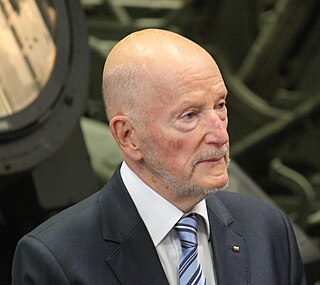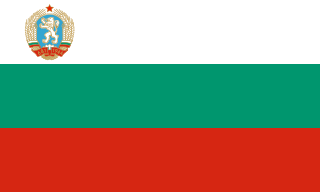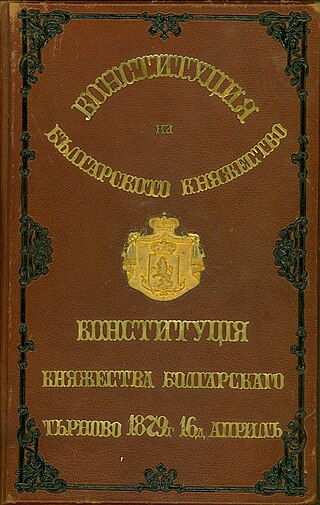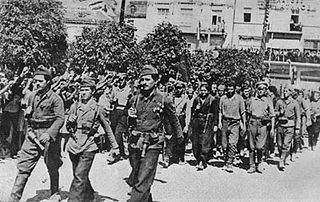
An institutional referendum was held in Italy on 2 June 1946, a key event of contemporary Italian history.
The abolition of monarchy and anti-royalism is a legislative or revolutionary movement to abolish monarchical elements in government, usually hereditary.

Simeon Borisov von Saxe-Coburg-Gotha is a Bulgarian politician who reigned as the last tsar of the Kingdom of Bulgaria as Simeon II from 1943 until 1946. He was six years old when his father Boris III of Bulgaria died in 1943 and royal power was exercised on his behalf by a regency council led by Simeon's uncle Kiril, Prince of Preslav, General Nikola Mihov and prime minister, Bogdan Filov. In 1946 the monarchy was abolished by referendum, and Simeon was forced into exile.

Bulgaria elects on the national level a head of state—the president—and a legislature. The president is elected for a five-year term directly by the people. The National Assembly has 240 members elected for a four-year term by proportional representation in multi-seat constituencies with a 4% threshold. Bulgaria has a multi-party system in which often no one party has a chance of gaining power alone and parties must work with each to form governments.
The Democratic Party is a centre-right political party in Bulgaria led by Alexander Pramatarski. The party was a member of the European People's Party (EPP).

The People's Republic of Bulgaria, from 1990 onwards known as Republic of Bulgaria, was the official name of Bulgaria when it was a socialist republic from 1946 to 1990, ruled by the Bulgarian Communist Party (BCP) together with its coalition partner, the Bulgarian Agrarian People's Union. Bulgaria was closely allied and one of the most loyal satellite states of the Soviet Union during the Cold War, sometimes being called the 16th Soviet Republic rather than an independent country. Bulgaria was also part of Comecon as well as a member of the Warsaw Pact. The Bulgarian resistance movement during World War II deposed the Kingdom of Bulgaria administration in the Bulgarian coup d'état of 1944 which ended the country's alliance with the Axis powers and led to the People's Republic in 1946.
After the Russo-Turkish War of 1877–1878, the 1878 Treaty of Berlin set up an autonomous state, the Principality of Bulgaria, within the Ottoman Empire. Although remaining under Ottoman sovereignty, it functioned independently, taking Alexander of Battenberg as its first prince in 1879. In 1885 Alexander took control of the still-Ottoman Eastern Rumelia, officially under a personal union. Following Prince Alexander's abdication (1886), a Bulgarian Assembly elected Ferdinand I as prince in 1887. Full independence from Ottoman control was declared in 1908.

The Tsardom of Bulgaria, also referred to as the Third Bulgarian Tsardom, sometimes translated in English as the "Kingdom of Bulgaria", was a constitutional monarchy in Southeastern Europe, which was established on 5 October 1908, when the Bulgarian state was raised from a principality to a tsardom.
Boris, Prince of Tarnovo, Duke in Saxony, known by his Spanish civilian name Boris de Sajonia-Coburgo-Gotha y Ungría, is the elder son of Miriam Ungría y López and Kardam, Prince of Tarnovo, the grandson of former Tsar Simeon II of Bulgaria and, through his mother's second marriage in 2022, the step-son of Prince Ghazi bin Muhammad, a first cousin of King Abdullah II of Jordan.

The Tarnovo Constitution was the first constitution of Bulgaria.

A referendum on maintaining the monarchy was held in Greece on 1 September 1946. The proposal was approved by 68.4% of voters with a turnout of 88.6%.

The 1944 Bulgarian coup d'état, also known as the 9 September coup d'état, was a coup that overthrew the government of Kingdom of Bulgaria carried out on the eve of 9 September 1944. During the People's Republic of Bulgaria it was called using the propaganda term People's Uprising of 9 September – on the grounds of the broad unrest and Socialist Revolution – as it was a turning point politically and the beginning of radical reforms towards Soviet-style socialism.

Constituent Assembly elections were held in Bulgaria between 1 and 30 January 1879, although only 117 of the 231 members of the Assembly were elected during this period. It followed the country's liberation from the Ottoman Empire, and saw the Conservative Party and the Liberal Party emerge as the two main parties. The Assembly was opened on 10 February, and convened in Veliko Tarnovo to ratify the country's first constitution, known as the Tarnovo Constitution, on 16 April. The parliament was later transferred to Sofia, which became the capital of the country.

Constitutional Assembly elections were held in Bulgaria on 27 October 1946, electing members of the sixth Grand National Assembly, which was tasked with adopting a new constitution. The Fatherland Front, an anti-fascist coalition dominated by the Bulgarian Communist Party, had come to power in 1944 following a coup. Now that World War II was over and the monarchy abolished, the communists wanted to adopt a new constitution. They won a large majority, with 54% of the vote and 278 of the 465 seats. Voter turnout was 93%. This would be the lowest vote share that the Communists or the Fatherland Front would claim during the 43 years of the People's Republic of Bulgaria. In subsequent years, the Fatherland Front would claim to win elections with unanimous or near-unanimous support. This would be the last truly multi-party elections until 1990.

Parliamentary elections were held in Bulgaria on 27 June 1971, the first held under the new Zhivkov Constitution, which had been approved in a referendum held a month earlier. The Fatherland Front, dominated by the Bulgarian Communist Party, was the only organisation to contest the election; all candidate lists had to be approved by the Front. The Front nominated one candidate for each constituency. Of the 400 candidates 268 were members of the Communist Party, 100 were members of the Bulgarian Agrarian National Union and the remaining 32 were unaffiliated. Voter turnout was reportedly 99.9%.

A constitutional referendum was held in Bulgaria on 16 May 1971. Voters were asked whether they approved of a new constitution. The new constitution defined Bulgaria as a "socialist state of the working people from the cities and the villages", led by the Bulgarian Communist Party in cooperation with the Bulgarian Agrarian National Union. The result was reportedly 99.7% in favour, with a voter turnout of 99.7%.
Parliamentary elections were held in Romania on 28 March 1948. They were the first elections held under in undisguised communist rule; the communist-dominated legislature had declared Romania a people's republic after King Michael was forced to abdicate in December 1947.

The National Liberal Party was a political party in Bulgaria.

The Bulgarian monarchs used the titles kanasubigi, khan, knyaz and tsar (emperor). When acceding to the throne in the First and Second Bulgarian Empire the occasion was marked with a coronation, conducted by the Bulgarian Orthodox Church. During the Third Bulgarian State accession was marked by an oath on the constitution.










